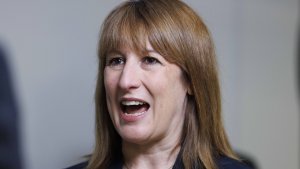Britain's expected slow economic growth will heap difficult tax and spending choices on whoever is in charge after the election.
Next UK Government Faces Toughest Challenge Since 1950s On Debt - IFS
Britain's expected slow economic growth will heap difficult tax and spending choices on whoever is in charge after the election.

The winner of Britain's next election will face probably the toughest challenge since the 1950s to bring down the country's high debt burden, a leading economic think tank said on Thursday.
Britain's expected slow economic growth will heap difficult tax and spending choices on whoever is in charge after the election which is likely to take place later this year, the Institute for Fiscal Studies said.
The IFS also warned that tax cuts - something Prime Minister Rishi Sunak and his finance minister Jeremy Hunt have said they want, possibly as soon as a March 6 budget statement - could compound the problem.
"Even if one believes that now is indeed the right moment for tax cuts, tax cuts today must add to the risk that either tax rises or spending cuts are required further down the line," the think tank said.
However, well-designed tax cuts could have a positive effect on growth, it said.
Both Britain's main political parties say they want to lower debt as a share of economic output in the future, leaving little fiscal room for manoeuvre in the coming years with forecasts showing the public finances meeting that target only narrowly.
Britain's tax burden is set to hit its highest since the Second World War while public debt is close to 100% of gross domestic product, up from 35% just over 15 years ago due to huge spending to support the economy during the global financial crisis, the COVID pandemic and the 2022 surge in energy prices.
"This will be a thorny inheritance for whoever is in office after this year's general election," the IFS said.
"Both Labour and the Conservatives have promised to reduce debt as a fraction of national income. Yet a combination of high debt interest payments and low growth is forecast to make this much more difficult to achieve than in the recent past."
Earlier this week, the head of Britain's fiscal watchdog criticised the current government's budget plans for providing no detail of how it will achieve the painful cuts to public services spending needed to hit its debt target.
"Some people have referred to that as a work of fiction," Richard Hughes, chair of the Office for Budget Responsibility, told a committee of lawmakers on Tuesday.
"I think that's probably generous given that someone has bothered to write a work of fiction whereas the government has not even bothered to write down what its departmental spending plans are."
(Writing by William Schomberg; editing by Christina Fincher)
Thanks for signing up to Minutehack alerts.
Brilliant editorials heading your way soon.
Okay, Thanks!

